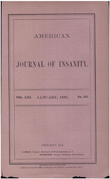Serum lithium levels and psychosocial function in patients with bipolar I disorder
Abstract
OBJECTIVE: This study compared the effect of two different serum lithium levels on the psychosocial functioning of patients with bipolar I disorder. METHOD: Ninety patients with bipolar I disorder were enrolled in a prospective, double-blind, maintenance trial of lithium. The patients were randomly assigned to treatment with doses of lithium adjusted to achieve a serum lithium concentration of either 0.8 to 1.0 mmol/liter (standard) or 0.4 to 0.6 mmol/liter (low). The Longitudinal Interval Follow-Up Evaluation was used to assess psychosocial functioning in the areas of work, interpersonal relationships, and global functioning. All observed values were analyzed with a mixed- effects analysis of covariance. Independent variables included treatment group (low or standard lithium serum level), relapse status, socioeconomic status, time from random treatment assignment to assessment, termination of protocol before or after relapse, length of remission before random treatment assignment, polarity of the last mood episode before random treatment assignment, and number of mood episodes in the 3 years before random treatment assignment. RESULTS: Relapse was associated with large negative effects on psychosocial functioning. Patients in higher socioeconomic brackets had better psychosocial functioning than did those in lower brackets. Patients receiving lithium doses that achieved standard serum levels had better psychosocial functioning than those receiving doses that achieved low serum levels; this effect was partially but not wholly mediated through relapse prevention. CONCLUSIONS: For patients with bipolar I disorder, standard serum lithium levels may enhance psychosocial functioning, above and beyond the effects of relapse prevention.
Access content
To read the fulltext, please use one of the options below to sign in or purchase access.- Personal login
- Institutional Login
- Sign in via OpenAthens
- Register for access
-
Please login/register if you wish to pair your device and check access availability.
Not a subscriber?
PsychiatryOnline subscription options offer access to the DSM-5 library, books, journals, CME, and patient resources. This all-in-one virtual library provides psychiatrists and mental health professionals with key resources for diagnosis, treatment, research, and professional development.
Need more help? PsychiatryOnline Customer Service may be reached by emailing [email protected] or by calling 800-368-5777 (in the U.S.) or 703-907-7322 (outside the U.S.).



